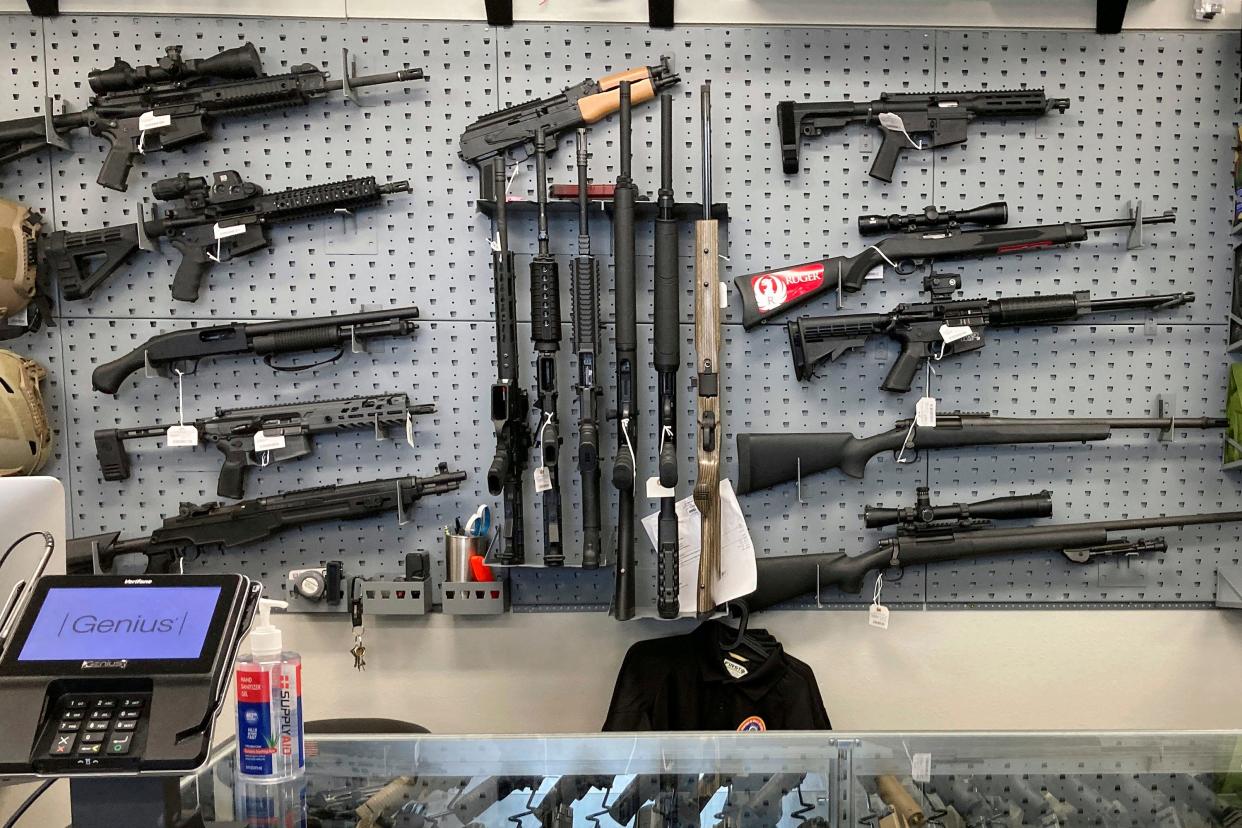State trial on constitutionality of Oregon's gun law begins Monday

- Oops!Something went wrong.Please try again later.
The fate of Oregon's voter-approved gun law, one of the strictest in the nation, could soon be decided.
A state trial surrounding Measure 114 begins Monday in Harney County. Circuit Judge Robert S. Raschio has scheduled six days for arguments on whether the law violates the Oregon Constitution.
Measure 114 narrowly passed last November, with 50.6% of voters in favor of the changes to the ownership and purchasing process for firearms in the state.
Under the measure, individuals are required to get a permit before purchasing a gun. Large-capacity magazines that hold more than 10 rounds of ammunition are prohibited unless owned by law enforcement or military members, or were purchased before the law's passage. The law also creates a statewide firearms database.
The measure was supposed to go into effect Dec. 8 but has been on hold as the state argues its legality in federal and state court. Raschio paused all parts of the measure in January, issuing a preliminary injunction.
In July, federal Judge Karin Immergut ruled the gun control measure is constitutional after a weeklong trial. Immergut ruled the large capacity magazine ban and permit requirement were in line with other regulations of weapons and permissible based on the language of other U.S. Supreme Court decisions.
Plaintiffs in that case have filed an appeal in the Ninth Circuit Court of Appeals and could move the decision to the U.S. Supreme Court.
What does Oregon's Measure 114 do?
The measure requires Oregonians to obtain a permit to purchase a gun. Applicants must pay a maximum $65 fee, submit a photo ID, be fingerprinted, pass a criminal background check and complete approved safety training.
Police chiefs, county sheriffs or their designees are the "permit agents" under the measure and would have 30 days to issue a permit.
Renewals would be $50.
State police are required to maintain a searchable electronic database of permits and report permit data. The sale and transfer of firearms to a person without a permit would be a Class A misdemeanor under the law and could be a felony if a repeated offense.
Measure 114 also prohibited the manufacturing, importing, purchasing, selling, possessing, using or transferring of magazines capable of holding more than 10 rounds. The restrictions were supposed to go into effect 180 days after the law's passage.
Law enforcement and armed services members were exempt, in addition to those who already owned or inherited the magazines for use on their property, at shooting ranges or competitions, for hunting, or while transporting them to a permissible location.
Testimony restricted
On Monday, gun owners Joseph Arnold and Cliff Asmussen will make their own argument at the state level.
Raschio has barred certain testimony in the case, including testimony from physicians about treating gunshot victims, victims and witnesses of gun violence.
Defendants had intended to call trauma surgeon Dr. Mackenzie Cook, the daughter of a victim of the Clackamas Town Center shooting, and provide testimony related to the number of rounds fired in self-defense situations, according to the motion from the plaintiffs.
While Raschio agreed to the plaintiffs' motion, he also granted the defendant's motion to exclude testimony relating to state and local efforts and ability to implement the measure.
Instead, Raschio said he will focus on the text of the measure as it applies to Article I, Section 27 of the Oregon Constitution.
"The question is whether or not Measure 114 is facially constitutional under the Oregon Constitution. So all of that evidence is outside the scope of the court's purview since I'm not making a policy decision," Raschio said, according to the Oregonian. "I'm just making a determination on the constitutionality of the ballot measure."
The trial begins at 9 a.m. Monday.
Dianne Lugo covers the Oregon Legislature and equity issues. Reach her at dlugo@statesmanjournal.com or on Twitter @DianneLugo
This article originally appeared on Salem Statesman Journal: Constitutionality of Oregon Measure 114 gun law to go on trial

